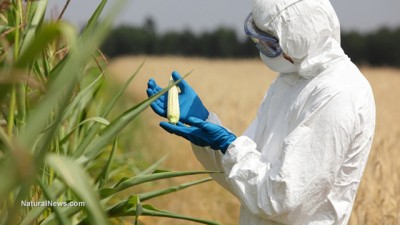Two Recent Developments Bring Fresh Concerns Over Genetically Modified Crops

Could it be that premier scientific journals are finally conveying the truth about GMOs? In a relatively recent exploration of ‘ubiquitous’ GMOs that have taken over our food supply, the New England Journal of Medicine tackles 2 new concerns over genetically modified organisms and the pesticides used to grow them.
As the journal points out, the omnipresence of GMOs are taken for granted by most physicians. They aren’t high on their list of health concerns, and barely receive a mention when patients come for a visit. This might start to change though, due to 2 fresh developments concerning GM crops.
1. The EPA Approved Enlist Due – A Toxic Herbicide Concoction

The first is the fact that there have been “sharp increases in the amounts and numbers of chemical herbicides applied to GM crops,” and the numbers are expected to increase.
The Environmental Protection Agency (EPA) recently approved Enlist Duo, a new combination herbicide comprising glyphosate and 2,4-D, both chemicals have been proven to be extremely dangerous to human health, and equally detrimental to the environment.
Enlist Duo was formulated to combat herbicide-resistance, a seeming paradox of poison meets poison, or a serpent eating its own tale to the most high degree. An infinite loop of disregard for nature only brought about more disregard with an ouroboros-like action.
If only biotech could actually sustain life with its destruction of it. Monsanto, Dow, Syngenta, etc. certainly have no plans to plant organic seeds in the burnt carnage they’ve left behind in our fields. In fact, Enlist Duo will be marketed with new GM seeds engineered and approved to withstand the spraying of more glyphosate and 2,4-D than ever before. Even the EPA admitted that it expects a 7-fold increase in the use of these pesticides due to their own approval of the chemical concoction.
How did the EPA manage to give Enlist Duo a green light? They used toxicology studies commissioned by herbicide manufacturers in the 1980’s and 1990’s that were never published – not an uncommon practice in U.S. pesticide regulation. These studies are of toxicology alone, and do not take into consideration the more recent studies showing what these pesticides and herbicides do to our endocrine system.
They also discount all epi-genetic effects, as well as ignoring health risks to infants and small children. Finally, these commissioned studies fail to look at environmental effects, either, as we’ve recently watched our pollinators suffer profoundly. As if this isn’t enough, the studies also fail to look at the ‘inactive’ ingredients in glyphosate or 2,4-D, known to be just as toxic as the active ingredients themselves.
2. The WHO Declares Widely-Used Herbicide “Probably Carcinogenic”

The second new development which is a cause for concern is the declaration by the IARC that glyphosate is a “probable human carcinogen” and 2,4-D is a “possible human carcinogen.”
These classifications were based on comprehensive assessments of the toxicologic and epidemiologic literature that linked both herbicides to dose-related increases in malignant tumors at multiple anatomical sites in animals and linked glyphosate to an increased incidence of non-Hodgkin’s lymphoma in humans.
These issues were important enough that The National Academy of Sciences convened a new committee to reassess the social, economic, environmental, and human health effects of GM crops. This development is welcome, but the committee’s report is not expected until at least 2016.
Unless we tell the EPA with vehemence that they need to reverse their decision on Enlist Duo, we’re just beginning to see the damage that GMOs can do. Their decision was based on bad science, and likely influenced by the motivations of those within the regulatory body that have deep ties with the biotech industry. The revolving door (see below) is killing our pollinators, us, and our future generations.
The New England Journal of Medicine summarizes the issue:
“We believe the time has come to revisit the United States’ reluctance to label GM foods. Labeling will deliver multiple benefits. It is essential for tracking emergence of novel food allergies and assessing effects of chemical herbicides applied to GM crops. It would respect the wishes of a growing number of consumers who insist they have a right to know what foods they are buying and how they were produced.
And the argument that there is nothing new about genetic rearrangement misses the point that GM crops are now the agricultural products most heavily treated with herbicides and that two of these herbicides may pose risks of cancer. We hope, in light of this new information, that the FDA will reconsider labeling of GM foods and couple it with adequately funded, long-term postmarketing surveillance.”
The Revolving Door, Biotech, And The Government
Revolving Door Between GMO Companies, And US Government Agencies:
-
“David W. Beier . . .former head of Government Affairs for Genentech, Inc. . . . chief domestic policy advisor to Al Gore when he was Vice President.
- Linda J. Fisher . . .former Assistant Administrator of the United States Environmental Protection Agency’s Office of Pollution Prevention, Pesticides, and Toxic Substances…now Vice President of Government and Public Affairs for Monsanto Corporation.
- Michael A. Friedman, M.D. . . former acting commissioner of the United States Food and Drug Administration (FDA) Department of Health and Human Services . . .now senior vice-president for clinical affairs at G. D. Searle & Co., a pharmaceutical division of Monsanto Corporation.
- Val Giddings . . . former biotechnology regulator and (biosafety) negotiator at the United States Department of Agriculture (USDA/APHIS) . . .now Vice President for Food & Agriculture of the Biotechnology Industry Organization (BIO).
- Marcia Hale . . . former assistant to the President of the United States and director for intergovernmental affairs . . .now Director of International Government Affairs for Monsanto Corporation.
- Michael (Mickey) Kantor. . . former Secretary of the United States Department of Commerce and former Trade Representative of the United States . . . now member of the board of directors of Monsanto Corporation.
- Josh King . . . former director of production for White House events. . . now director of global communication in the Washington, D.C. office of Monsanto Corporation.
- Terry Medley . . . former administrator of the Animal and Plant Health Inspection Service (APHIS) of the United States Department of Agriculture, former chair and vice-chair of the United States Department of Agriculture Biotechnology Council, former member of the U.S. Food and Drug Administration (FDA) food advisory committee…and now Director of Regulatory and External Affairs of Dupont Corporation’s Agricultural Enterprise.
- Margaret Miller . . . former chemical laboratory supervisor for Monsanto, . . .now Deputy Director of Human Food Safety and Consultative Services, New Animal Drug Evaluation Office, Center for Veterinary Medicine in the United States Food and Drug Administration (FDA).*
- Michael Phillips . . . recently with the National Academy of Science Board on Agriculture . . . now head of regulatory affairs for the Biotechnology Industry Organization.
- William D. Ruckelshaus . . . former chief administrator of the United States Environmental Protection Agency (USEPA). . .now (and for the past 12 years) a member of the board of directors of Monsanto Corporation.
- Michael Taylor . . . former legal advisor to the United States Food and Drug Administration (FDA)’s Bureau of Medical Devices and Bureau of Foods, later executive assistant to the Commissioner of the FDA… still later a partner at the law firm of King & Spaulding where he supervised a nine-lawyer group whose clients included Monsanto Agricultural Company… still later Deputy Commissioner for Policy at the United States Food and Drug Administration, . . . and later with the law firm of King & Spaulding… now head of the Washington, D.C. office of Monsanto Corporation.*
- Lidia Watrud . . . former microbial biotechnology researcher at Monsanto Corporation in St. Louis, Missouri, . . .now with the United States Environmental Protection Agency Environmental Effects Laboratory, Western Ecology Division.
- Jack Watson. . .former chief of staff to the President of the United States, Jimmy Carter, . . .now a staff lawyer with Monsanto Corporation in Washington, D.C.
- Clayton K. Yeutter . . . former Secretary of the U.S. Department of Agriculture, former U.S. Trade Representative (who led the U.S. team in negotiating the U.S. Canada Free Trade Agreement and helped launch the Uruguay Round of the GATT negotiations), now a member of the board of directors of Mycogen Corporation, whose majority owner is Dow AgroSciences, a wholly owned subsidiary of The Dow Chemical Company.
- Larry Zeph . . . former biologist in the Office of Prevention, Pesticides, and Toxic Substances, U.S. Environmental Protection Agency, . . . now Regulatory Science Manager at Pioneer Hi-Bred International.
-
*Margaret Miller, Michael Taylor, and Suzanne Sechen (an FDA “primary reviewer for all rbST and other dairy drug production applications” ) were the subjects of a U.S. General Accounting Office (GAO) investigation in 1994 for their role in the U.S. Food and Drug Administration’s approval of Posilac, Monsanto Corporation’s formulation of recombinant bovine growth hormone (rbST or rBGH). The GAO Office found “no conflicting financial interests with respect to the drug’s approval” and only “one minor deviation from now superseded FDA regulations”. (Quotations are from the 1994 GAO report).”

